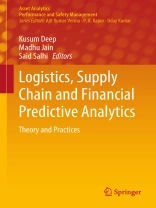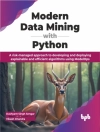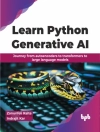This book addresses a broad range of problems commonly encountered in the fields of financial analysis, logistics and supply chain management, such as the use of big data analytics in the banking sector. Divided into twenty chapters, some of the contemporary topics discussed in the book are co-operative/non-cooperative supply chain models for imperfect quality items with trade-credit financing; a non-dominated sorting water cycle algorithm for the cardinality constrained portfolio problem; and determining initial, basic and feasible solutions for transportation problems by means of the “supply demand reparation method” and “continuous allocation method.” In addition, the book delves into a comparison study on exponential smoothing and the Arima model for fuel prices; optimal policy for Weibull distributed deteriorating items varying with ramp type demand rate and shortages; an inventory model with shortages and deterioration for three different demand rates; outlier labeling methodsfor medical data; a garbage disposal plant as a validated model of a fault-tolerant system; and the design of a “least cost ration formulation application for cattle”; a preservation technology model for deteriorating items with advertisement dependent demand and trade credit; a time series model for stock price forecasting in India; and asset pricing using capital market curves.
The book offers a valuable asset for all researchers and industry practitioners working in these areas, giving them a feel for the latest developments and encouraging them to pursue further research in this direction.
Зміст
Chapter 1: Co-operative/non-cooperative supply chain models for imperfect quality items with trade-credit financing.- Chapter 2: Determination of initial basic feasible solution for transportation problems using supply demand reparation method and continuous allocation method.- Chapter 3: Comparison study on exponential smoothing and arima model for the fuel price.- Chapter 4: An optimal policy for weibull distributed deteriorating items varying with ramp type demand rate and shortages.- Chapter 5: Inventory model with shortages and deterioration for three different demand rates.- Chapter 6: Outlier labeling methods for medical data .- Chapter 7: Goal programming model to budgetary allocation in garbage disposal plant.- Chapter 8: A validated model of a fault-tolerant system.- Chapter 9: Formation and designing of “least cost ration formulation application of cattle” using excel vba.- Chapter 10: New stable numerical inversion of generalized abel integral equation.- Chapter 11: Empirical analysis of probabilistic bounds.- Chapter 12: A graph-theoretical approach for comparison between the pair of allied ragas bhupali and deshkar of north indian classical music.- Chapter 13: A general class of tests for testing homogeneity of location parameters against ordered alternatives.- Chapter 14: Modelling of male age at marriage: evidences from western region of uttar pradesh (india) .- Chapter 15: Copula functions and applications in engineering.- Chapter 16: A preservation technology model for deteriorating items with advertisement dependent demand and trade credit.- Chapter 17: Time series model for stock price forecasting in india.- Chapter 18: asset pricing through capital market curve.- Chapter 19: Non-dominated sorting water cycle algorithm for optimal selection of cardinality constrained portfolio problem.- Chapter 20: Tqm indicators implemented by teachers of the primary school.
Про автора
Dr. Kusum Deep is a Professor at the Department of Mathematics, Indian Institute of Technology Roorkee. Her research interests include numerical optimization, nature inspired optimization, computational intelligence, genetic algorithms, parallel genetic algorithms, and parallel particle swarm optimization.
Dr. Madhu Jain is an Associate Professor at the Department of Mathematics, Indian Institute of Technology Roorkee. Her research interests include computer communications networks, performance prediction of wireless systems, mathematical modeling, and biomathematics.
Dr. Said Salhi is Director of the Centre for Logistics & Heuristic Optimization (CLHO) at Kent Business School, University of Kent, UK. Prior to his appointment at Kent in 2005, Said served at the University of Birmingham’s School of Mathematics for 15 years, where in the latter years he acted as Head of the Management Mathematics Group. He obtained his BSc in Mathematics at Algiers’s University, and his MSc and Ph D in OR at Southampton (Institute of Mathematics) and Lancaster (School of Management), respectively. Dr. Said has edited 6 special journal issues, chaired the European Working Group in Location Analysis in 1996 and recently the International Symposium on Combinatorial Optimisation (CO2016) in Kent, 1–3 September 2016. He has published over 100 papers in academic journals.












